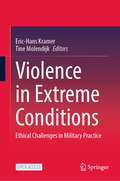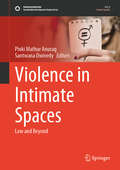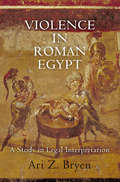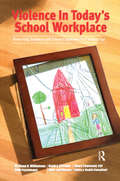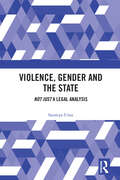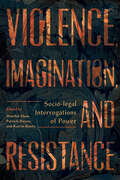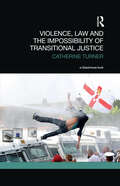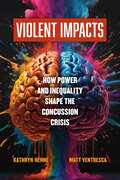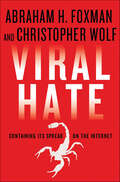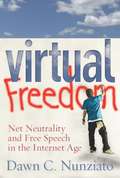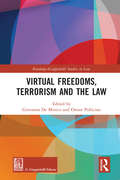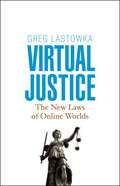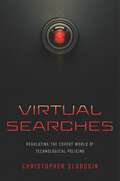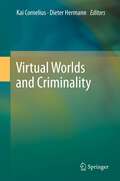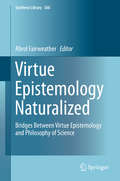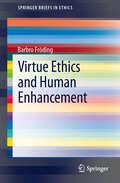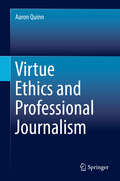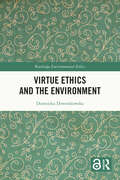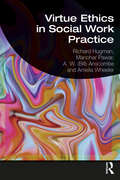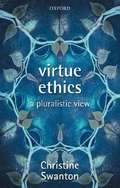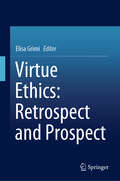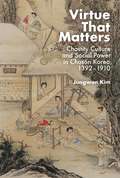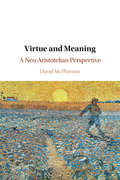- Table View
- List View
Violence in Extreme Conditions: Ethical Challenges in Military Practice
by Eric-Hans Kramer Tine MolendijkAs an organization operating under extreme conditions, the military is often confronted with destructive behavior from individuals, organizations, and societies. Written by experts from a variety of disciplines, this open access book reflects on confrontations with violence under extreme conditions and the various challenges that arise.By examining real first-hand accounts of soldiers’ deployments, the contributions shed new light on the multifaceted and sometimes hidden dynamics of destructive violent behavior and offer an ethical reflection on military practices. In addition, they address topics such as moral decision-making in violent contexts, military trauma, organizational change, and military ethics education.The interdisciplinary exploration of these topics has been the primary focus of Désirée Verweij, who was the Chair of Military Ethics at the Netherlands Defence Academy from 2008 to 2021. The contributions in this book are written in honor of her scholarly achievements and help to ensure that these important issues continue to receive attention. The book will appeal to scholars of military studies, organizational studies and military ethics, and to professionals and decisionmakers in military organizations.
Violence in Intimate Spaces: Law and Beyond (Sustainable Development Goals Series)
by Pinki Mathur Anurag Santwana DwivedyThis book provides a textured understanding of intimate violence across the unlimited stretch of human relationships, institutions, and social structures. The volume has been conceptualized with the overarching objective to provide the reader with a collection of thoughtfully selected chapters that critically examine existing literature for an in-depth analysis of institutions through the lens of violence, beyond disciplinary and topical boundaries, from a range of methodologies. The book encourages reflections on the complexities of society, its institutions and gendered norms that enmesh violence and intimate relationships. It further examines the socio-normative contexts within which violence operates as a tool for maintaining inequalities in society. The chapters in this volume attempt to address questions such as: What are the complexities in the relationship between the perpetrator and the victim which sustain and legitimize violence? What are the diverse dimensions of violence in intimate relationships? What role does violence in intimate spaces play in preserving status quo and the pervasive gendered hierarchies within society and its institutions? Who is vulnerable to violence and why? The book covers conversations on intimate space violence and relationships that have not been explored hitherto in mainstream academic debates. The volume pivots violence fundamentally as a product of ‘entitlements’ based on gendered social hierarchies and critical intersectionalities to examine its manifestations in a variety of intimate situations and relationships beyond socio-cultural, religious and geographical boundaries. The book provides invaluable learnings for academics, researchers, students, lawyers, sociologists, social workers, health professionals and policymakers.
Violence in Roman Egypt: A Study in Legal Interpretation (Empire and After)
by Ari Z. BryenWhat can we learn about the world of an ancient empire from the ways that people complain when they feel that they have been violated? What role did law play in people's lives? And what did they expect their government to do for them when they felt harmed and helpless?If ancient historians have frequently written about nonelite people as if they were undifferentiated and interchangeable, Ari Z. Bryen counters by drawing on one of our few sources of personal narratives from the Roman world: over a hundred papyrus petitions, submitted to local and imperial officials, in which individuals from the Egyptian countryside sought redress for acts of violence committed against them. By assembling these long-neglected materials (also translated as an appendix to the book) and putting them in conversation with contemporary perspectives from legal anthropology and social theory, Bryen shows how legal stories were used to work out relations of deference within local communities.Rather than a simple force of imperial power, an open legal system allowed petitioners to define their relationships with their local adversaries while contributing to the body of rules and expectations by which they would live in the future. In so doing, these Egyptian petitioners contributed to the creation of Roman imperial order more generally.
Violence in Today's School Workplace: Protecting Teachers and School Employees in a Violent Age
by Diane H. Williamson David E. Strecker Henry TownsendIncreasingly, headlines today report out-of-control student violence occurring in our schools and colleges. Yet so little concrete action is being taken to protect the bystanding victims of this trauma, the school worker. Classroom teachers, administrators, coaches, school bus drivers, cafeteria workers, custodians, and other school employees a
Violence, Gender and the State: ‘Not Just’ A Legal Analysis
by Saumya UmaThis book examines the adequacy of laws in India as a response to sexual and gender-based violence against women. It addresses questions such as: is law doing enough in responding to violence against women in India? Where are the barriers and bottlenecks, particularly for women from marginalised communities? What can be done to ensure that justice is rendered? Based on women’s experience of violence, not solely on the basis of gender, but a combination of caste, class, and religious and gender identities, the book examines law as a response to gendered violence against women in India through the lens of intersectionality. It combines socio-legal and feminist analyses of relevant statutes on sexual and gender-based violence, their judicial interpretations, their implementation by law enforcement agencies, and their ramifications for women’s lives. This book will be of interest to academics, research scholars, and students in a range of disciplines, including law, women’s studies, gender and sexuality studies, victimology, sociology, political science, and human rights. It will also be useful for policymakers, advocates, judicial officers, paralegal workers, women’s rights campaigners, non-profit organisations and, globally, anyone interested in and concerned with justice for women in India.
Violence, Imagination, and Resistance: Socio-legal Interrogations of Power
by Katrin Roots Mariful Alam Patrick DwyerMuch of the discussion of social transformation and resistance in socio-legal studies centres around the question of whether and how the law can be used to achieve practical change. However, the editors of this volume argue that it will never be possible to enact change through the law because it is inseparable from violence, be it metaphysical, social, or political. They posit that a “just world,” free from oppressive power relations, requires us to imagine communities where the state and its law cease to exist. Contributors address the underexplored questions of what alternatives to law could look like: how communities could organize their everyday lives, and how they could address social and interpersonal conflicts outside of an apparatus of violence. These essays contribute to the ongoing interrogation of settler colonialism, racism, and structural violence in Canada by demonstrating how to expose the violence the law produces, how to deconstruct law’s power, and, finally, how to identify modes of resistance that have transformative potential.
Violence, Law and the Impossibility of Transitional Justice
by Catherine TurnerThe field of transitional justice has expanded rapidly since the term first emerged in the late 1990s. Its intellectual development has, however, tended to follow practice rather than drive it. Addressing this gap, Violence, Law and the Impossibility of Transitional Justice pursues a comprehensive theoretical inquiry into the foundation and evolution of transitional justice. Presenting a detailed deconstruction of the role of law in transition, the book explores the reasons for resistance to transitional justice. It explores the ways in which law itself is complicit in perpetuating conflict, and asks whether a narrow vision of transitional justice – underpinned by a strictly normative or doctrinal concept of law – can undermine the promise of justice. Drawing on case material, as well as on perspectives from a range of disciplines, including law, political science, anthropology and philosophy, this book will be of considerable interest to those concerned with the theory and practice of transitional justice.
Violent Impacts: How Power and Inequality Shape the Concussion Crisis
by Matt Ventresca Kathryn HenneA free ebook version of this title is available through Luminos, University of California Press’s Open Access publishing program. Visit www.luminosoa.org to learn more. Concerns regarding brain injury in sport have escalated into what is often termed a "concussion crisis," fueled by high-profile lawsuits and deaths. Although athletes are central figures in this narrative, they comprise only a small proportion of the people who experience brain injuries, while other high-risk groups—including victims of domestic violence and police brutality—are all too often left out of the story. In Violent Impacts, Kathryn Henne and Matt Ventresca examine what is and what isn’t captured in popular discourse, scrutinizing how law, science, and social inequalities shape depictions and understandings of brain injury. Drawing on research carried out in Australia, Canada, and the United States, they illustrate how structural violence centers certain bodies as part of the concussion crisis while pushing others to the margins.
Viral Hate: Containing Its Spread on the Internet
by Christopher Wolf Abraham H. FoxmanEmboldened by anonymity, individuals and organizations from both left and right are freely spewing hateful vitriol on the Internet without worrying about repercussions.Lies, bullying, conspiracy theories, bigoted and racist rants, and calls for violence targeting the most vulnerable circulate openly on the web.And thanks to the guarantees of the First Amendment and the borderless nature of the Internet,governing bodies are largely helpless to control this massive assault on human dignity and safety. Abe Foxman and Christopher Wolf expose the threat that this unregulated flow of bigotry poses to the world.They explore how social media companies like Facebook and YouTube, as well as search engine giant Google, are struggling to reconcile the demands of business with freedom of speech and the disturbing threat posed by today's purveyors of hate. And they explain the best tools available to citizens, parents, educators, law enforcement officers, and policy makers toprotect thetwin values of transparency and responsibility. As Foxman and Wolf show, only an aroused and engaged citizenry can stop the hate contagion before it spirals out of control - with potentially disastrous results.
Virtual Competition
by Ariel EzrachiAriel Ezrachi and Maurice Stucke take a hard look at today's app-assisted paradise of digital shopping. The algorithms and data-crunching that make online purchasing so convenient are also changing the nature of the market by shifting power into the hands of the few, with risks to competition, our democratic ideals, and our overall well-being.
Virtual Freedom
by Dawn C. NunziatoCommunications giants like Google, Comcast, and AT&T enjoy increasingly unchecked control over speech. As providers of broadband access and Internet search engines, they can control online expression. Their online content restrictions-from obstructing e-mail to censoring cablecasts-are considered legal because of recent changes in free speech law. In this book, Dawn Nunziato criticizes recent changes in free speech law in which only the government need refrain from censoring speech, while companies are permitted to self-regulate. By enabling Internet providers to exercise control over content, the Supreme Court and the FCC have failed to protect the public's right to access a broad diversity of content. Nunziato argues that regulation is necessary to ensure the free flow of information and to render the First Amendment meaningful in the twenty-first century. This book offers an urgent call to action, recommending immediate steps to preserve our free speech rights online.
Virtual Freedoms, Terrorism and the Law (Routledge-Giappichelli Studies in Law)
by Giovanna De MinicoThis book examines the risks to freedom of expression, particularly in relation to the internet, as a result of regulation introduced in response to terrorist threats. The work explores the challenges of maintaining security in the fight against traditional terrorism while protecting fundamental freedoms, particularly online freedom of expression. The topics discussed include the clash between freedom of speech and national security; the multijurisdictional nature of the internet and the implications for national sovereignty and transnational legal structures; how to determine legitimate and illegitimate association online; and the implications for privacy and data protection. The book presents a theoretical analysis combined with empirical research to demonstrate the difficulty of combatting internet use by terror organizations or individuals and the range of remedies that might be drawn from national and international law. The work will be essential reading for students, researchers and policy makers in the areas of Constitutional law; Criminal Law, European and International law, Information and Technology law and Security Studies.
Virtual Justice
by Greg LastowkaTens of millions of people today are living part of their life in a virtual world. In places like World of Warcraft, Second Life, and Free Realms, people are making friends, building communities, creating art, and making real money. Business is booming on the virtual frontier, as billions of dollars are paid in exchange for pixels on screens. But sometimes things go wrong. Virtual criminals defraud online communities in pursuit of real-world profits. People feel cheated when their avatars lose virtual property to wrongdoers. Increasingly, they turn to legal systems for solutions. But when your avatar has been robbed, what law is there to assist you? InVirtual Justice,Greg Lastowka illustrates the real legal dilemmas posed by virtual worlds. Presenting the most recent lawsuits and controversies, he explains how governments are responding to the chaos on the cyberspace frontier. After an engaging overview of the history and business models of today's virtual worlds, he explores how laws of property, jurisdiction, crime, and copyright are being adapted to pave the path of virtual law. Virtual worlds are becoming more important to society with each passing year. This pioneering study will be an invaluable guide to scholars of online communities for years to come.
Virtual Law Practice: How to Deliver Legal Services Online
by Stephanie L. KimbroThe legal market has recently experienced a dramatic shift as lawyers seek out alternative methods of practicing law and providing more affordable legal services. Virtual law practice is revolutionizing the way the public receives legal services and how legal professionals work with clients. Stephanie Kimbro's practical guide teaches lawyers how to set up and run a virtual law firm. It provides case studies of individual virtual law practices along with client scenarios to show how web-based technology may be used by legal professionals to work with online clients and avoid malpractice risks.
Virtual Searches: Regulating the Covert World of Technological Policing
by Christopher SloboginChoice Outstanding Academic Title 2023A close look at innovations in policing and the law that should govern themA host of technologies—among them digital cameras, drones, facial recognition devices, night-vision binoculars, automated license plate readers, GPS, geofencing, DNA matching, datamining, and artificial intelligence—have enabled police to carry out much of their work without leaving the office or squad car, in ways that do not easily fit the traditional physical search and seizure model envisioned by the framers of the Constitution. Virtual Searches develops a useful typology for sorting through this bewildering array of old, new, and soon-to-arrive policing techniques. It then lays out a framework for regulating their use that expands the Fourth Amendment’s privacy protections without blindly imposing its warrant requirement, and that prioritizes democratic over judicial policymaking. The coherent regulatory regime developed in Virtual Searches ensures that police are held accountable for their use of technology without denying them the increased efficiency it provides in their efforts to protect the public. Whether policing agencies are pursuing an identified suspect, constructing profiles of likely perpetrators, trying to find matches with crime scene evidence, collecting data to help with these tasks, or using private companies to do so, Virtual Searches provides a template for ensuring their actions are constitutionally legitimate and responsive to the polity.
Virtual Worlds and Criminality
by Dieter Hermann Kai Cornelius, LL.M.The fusion between virtuality and reality has created a new quality of experience establishing metaverses and virtual worlds. Second Life, Twinity, Entropia Universe or Fregger have experienced rapid growth in recent years and show no signs of slowing down. Not only have countless companies discovered these "virtureal worlds" as marketplaces, but so have fraudsters and other criminals. In this book, European experts from different academic disciplines show how to meet the new challenges arising from virtual worlds. They discuss the reasons for and the impacts of these new forms of criminality as well as the necessity and means of combating them. Moreover, other fundamental issues are examined, such as the addictive potential of virtual-world use, media violence, and conflict resolution problems arising in the context of virtual worlds.
Virtue Epistemology Naturalized: Bridges Between Virtue Epistemology and Philosophy of Science (Synthese Library #366)
by Abrol FairweatherThis book presents four bridges connecting work in virtue epistemology and work in philosophy of science (broadly construed) that may serve as catalysts for the further development of naturalized virtue epistemology. These bridges are: empirically informed theories of epistemic virtue; virtue theoretic solutions to under determination; epistemic virtues in the history of science; and the value of understanding.Virtue epistemology has opened many new areas of inquiry in contemporary epistemology including: epistemic agency, the role of motivations and emotions in epistemology, the nature of abilities, skills and competences, wisdom and curiosity.Value driven epistemic inquiry has become quite complex and there is a need for a responsible and rigorous process of constructing naturalized theories of epistemic virtue. This volume makes the involvement of the sciences more explicit and looks at the empirical aspect of virtue epistemology.Concerns about virtue epistemology are considered in the essays contained here, including the question: can any virtue epistemology meet both the normativity constraint and the empirical constraint? The volume suggests that these worries should not be seen as impediments but rather as useful constraints and desiderata to guide the construction of naturalized theories of epistemic virtue.
Virtue Ethics and Human Enhancement
by Barbro FrödingThis book shows how pressing issues in bioethics - e.g. the ownership of biological material and human cognitive enhancement - successfully can be discussed with in a virtue ethics framework. This is not intended as a complete or exegetic account of virtue ethics. Rather, the aim here is to discuss how some key ideas in Aristotle's Nicomachean Ethics, when interpreted pragmatically, can be a productive way to approach some hot issues in bioethics. In spite of being a very promising theoretical perspective virtue ethics has so far been underdeveloped both in bioethics and neuroethics and most discussions have been conducted in consequentialist and/or deontological terms.
Virtue Ethics and Professional Journalism
by Aaron QuinnThis book examines the moral role of news media practitioners and organizations, and applies a modified philosophical account of Virtue Ethics as a framework for the role of journalists—and journalism organizations—in public life. It shows how journalists and news organizations that adopt an aim towards professional excellence (virtue) by putting a premium on investigative journalism—with both large and small measures depending on the nature of the reporting—can achieve lofty professional goals under modern deadlines. The news media, both electronic and traditional, are imperative to an informed public, and an informed public is critical to a properly functioning cross-section of social, government and corporate domains. The book emphasizes the virtues of justice and integrity as foundational to professional practice. It examines the modern ethical challenges presented by organizations ranging from online upstarts to massive media conglomerates, each that have economic challenges that can inhibit professional excellence through corruption or corrosion. The author applies his account of virtue—bolstered by suggestions for complementary reforms in education and regulation—to improve an ethically challenged industry as it undergoes significant technological change.
Virtue Ethics and the Environment (Routledge Environmental Ethics)
by Dominika DzwonkowskaThis book addresses one of today’s most burning issues, namely the environmental crisis, by offering an insight into the problem from the perspective of virtue ethics.Virtue ethics is an approach to ethics that centralizes the concept of moral virtue, which can be extended to environmental ethics via environmental virtue ethics (EVE). Beginning with a comprehensive overview, the book explores the renaissance of contemporary virtue ethics and the beginnings of EVE in the second half of the 20th century and presents the main characteristics, proponents, and criticisms of EVE. The book then goes on to analyze its development by distinguishing the three most influential concepts: the classical; the naturalistic, teleological, and pluralistic; and the narrative conception of environmental virtue ethics. The author also discusses the most influential works on EVE, including a revision of Louke van Wensveen’s postulate to use virtue language in environmental ethics. By synthesizing such works on EVE alongside an analysis of the three most important concepts, the book offers a new concept that is universalistic, positive, and pragmatic.The book will be useful for students, scholars, and researchers studying environmental ethics, sustainable development, environmental psychology, moral philosophy, and philosophy of education.
Virtue Ethics in Social Work Practice
by Manohar Pawar Richard Hugman A. W. Anscombe Amelia WheelerUsing evidence from research with practitioners, integrated with wider material about virtue ethics in the helping professions, this book explores important types of virtue that are central to developing and sustaining excellence in social work. Comprised of ten chapters and drawing on extensive research with social workers as well as wider debates and analysis, the discussion carefully concentrates on everyday experiences and achievements. This approach enables the book to avoid an idealized and prescriptive approach by making clear that virtues vary between contexts and individuals, while at the same time clearly marking out qualities and characteristics of social work that are foundational to the development of practitioners and of the profession as a whole. It will be required reading for students on all BSc/BSW and MSc/MSW courses on professional ethics or preparation for practice. It will also be of interest to practitioners in other professions, including human services, health, education and social development or development studies.
Virtue Ethics: A Pluralistic View
by Christine SwantonChristine Swanton offers a new, comprehensive theory of virtue ethics which addresses the major concerns of modern ethical theory from a character-based perspective. Discussion of many problems in moral theory, such as moral constraints, rightness of action, the good life, the demandingness of ethics, the role of the subjective, and the practicality of ethics, has been dominated by Kantian and Consequentialist theories, with their own distinctive conceptual apparatus. Virtue Ethics shows how a different framework can shed new light on these intractable issues. Swanton's approach is distinctive in departing in significant ways from classical versions of virtue ethics derived primarily from Aristotle. Employing insights from Nietzsche and other sources, she argues against both eudaimonistic virtue ethics and traditional virtue ethical conceptions of rightness. In developing a pluralistic view, she shows how different modes of moral acknowledgement' such as love, respect, appreciation, and creativity, are embedded in the very fabric of virtue, the moral life, and the good life.
Virtue Ethics: Retrospect and Prospect
by Elisa GrimiThe rise of the phenomenon of virtue ethics in recent years has increased at a rapid pace. Such an explosion carries with it a number of great possibilities, as well as risks. This volume has been written to contribute a multi-faceted perspective to the current conversation about virtue. Among many other thought-provoking questions, the collection addresses the following: What are the virtues, and how are they enumerated? What are the internal problems among ethicists, and what are the objections and replies to contemporary virtue ethics? Additionally, the practical implications following from the answers to these questions are discussed in new and fascinating research. Fundamental concepts such as teleology and eudaimonism are addressed from both a historical and dialectical approach. This tome will contribute not only to providing further clarity to the current horizons in virtue ethics, but also to the practical conclusion following from the study: to challenge the reader toward a greater pursuit of the virtuous life.
Virtue That Matters: Chastity Culture and Social Power in Chosŏn Korea (1392–1910) (Harvard East Asian Monographs)
by Jungwon KimVirtue That Matters is a groundbreaking exploration of the intricate dynamics of chastity culture in Chosŏn Korea from 1392 to 1910, shedding light on its political, legal, social, and cultural significance. In this book, Jungwon Kim demonstrates how an emphasis on female chastity came to pervade society as it intertwined with state ideology and elite interests. By analyzing a copious range of sources including governmental publications, legal records, and women’s own writings, Kim unveils the rich tapestry of Chosŏn society’s attitudes toward female chastity and argues that extreme chastity culture was not merely a product of Confucianization but was also shaped by diverse social forces and individual agency. Furthermore, Kim reframes the discourse on chastity by focusing on women’s experiences and perspectives, challenging the traditional portrayal of women as marginal to Chosŏn history. Virtue That Matters illustrates the complex interplay between state-led indoctrination, socio-legal changes, and gender relations in Chosŏn Korea. Kim also shows how the discourse on women’s chastity evolved over time and continued to influence social dynamics well into the twentieth century. By highlighting the enduring legacy of chastity culture in modern Korean society, Virtue That Matters provides valuable insights into contemporary debates on gender and sexuality.
Virtue and Meaning: A Neo-Aristotelian Perspective
by David McPhersonThe revival of Aristotelian virtue ethics can be seen as a response to the modern problem of disenchantment, that is, the perceived loss of meaning in modernity. However, in Virtue and Meaning, David McPherson contends that the dominant approach still embraces an overly disenchanted view. In a wide-ranging discussion, McPherson argues for a more fully re-enchanted perspective that gives better recognition to the meanings by which we live and after which we seek, and to the fact that human beings are the meaning-seeking animal. In doing so, he defends distinctive accounts of the relationship between virtue and happiness, other-regarding demands, and the significance of linking neo-Aristotelian virtue ethics with a view of the meaning of life and a spiritual life where contemplation has a central role. This book will be valuable for philosophers and other readers who are interested in virtue ethics and the perennial question of the meaning of life.
